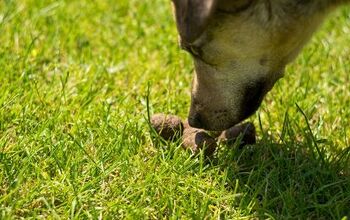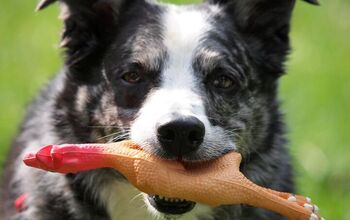Should My Healthy, Active Dog Take Supplements?

As a devoted pet owner, providing your beloved dog with a happy, healthy life is a top priority. In today’s society, we are lucky to have a wide range of pet products available to us, making it easier than ever to overcome any challenges your dog may face regarding their health and well-being. Unfortunately, this can also make identifying the right products feel overwhelming. Does your dog need any supplements or vitamins? If so, what options should you consider?
As a dog mom with three active hiking dogs, I am often asked why I include supplements with my dogs’ meals and whether they are necessary. In this article, we will look at some of the most common supplements on the market, what they can help with, and how to decide if it’s time to introduce supplements into your dog’s diet.
Is it Good to Give Your Dog Supplements?
Whether supplements can improve your dog’s diet depends first on what you feed. Most high-quality pet foods today are formulated to meet all your dog’s nutritional requirements without the need for any added toppers or supplements. Dogs fed a homemade diet, either raw or cooked, may need supplements to ensure nothing is lacking. The best way to determine this is to work with a qualified canine nutritionist. They will assess your dog’s current diet, identify any gaps in the nutritional breakdown and recommend changes or supplements to address this need.
But this isn’t the only reason to consider supplements for dogs.
There are many unique health conditions or lifestyles that may benefit from the addition of nutritional supplements. For example, you can purchase supplements for arthritic dogs that help ease joint pain and improve mobility. There are also products to help address allergies and itchy skin, anxiety, health conditions like pancreatitis or diabetes, and weight loss.
How Do I Know if My Dog is Lacking Nutrients?
A nutritional deficiency is one of the most common reasons for supplements or daily vitamins. This doesn’t necessarily mean your dog isn’t eating – but their diet lacks the essential vitamins and minerals to support their necessary bodily functions. Failing to meet these dietary needs can lead to obesity, growth disorders, organ disease, organ failure, or death in the most severe cases.
The most common signs that your dog’s diet may need to be re-evaluated include:
- Dull coat
- Excessive shedding
- Loss of fur
- Irritated skin or skin disorders
- Dandruff
- Body odor
- Unexplained weight loss or weight gain
- Inability to gain weight
- Stunted growth
- Bowed limbs
- Flatulence
- Unusual bowel movements
- Bad breath
If you notice any of these signs, contact your veterinarian to make an appointment. They will run tests to rule out any potential medical causes. They may recommend dietary changes at this point to address the symptoms. If not, working with a canine nutritionist will help you identify the best course of action.
At What Age Should I Give My Dog Supplements?
There is no one-size-fits-all answer as to when to introduce supplements into your dog’s diet. Instead, this will depend on several factors, including your dog’s breed and their lifestyle.
Several dog breeds experience a higher rate of joint issues, hip and elbow dysplasia, or early-onset arthritis. For these dogs, introducing a joint supplement early in their lives will support better joint health and help prevent or delay the onset of these conditions. The same can be applied to breeds known to develop skin disorders or problems with their vision.
However, you should avoid giving supplements to a young puppy until at least one-year-old unless recommended by your veterinarian.
Which Supplements Are Recommended for a Healthy, Active Dog?
Returning to the original question, should you be considering supplements for active dogs? If your dog lives a busy lifestyle where they regularly engage in physical activity or high-energy sports, supplements can play an essential role in maintaining their health and protecting them from injury.
Consider, for a moment, a person devoted to working out daily. There is a good chance that they are taking supplements to support this healthy lifestyle. The same concept applies to our dogs.
We live a highly active lifestyle with our three rescue dogs, including daily hikes and outdoor adventures. They are all high-energy herding and sporting breeds, meaning they have an incredible need to “go.” If they aren’t given a task to focus on or a healthy outlet for their energy, it can lead to behavioral problems.
There are several supplements that veterinarians and other pet professionals recommend for active dogs like our crew. This includes products to support healthy joints, boost and sustain energy, reduce inflammation, and more. While these aren’t necessary for having “proper nutrition,” they help prevent injuries they may sustain in their activity of choice.
Some of the most recommended supplements for active dogs include:
- Glucosamine: A naturally occurring compound that supports healthy joints. It can also offer relief from the impact of arthritis in aging dogs.
- Chondroitin: Another joint-focused compound that naturally occurs in the cartilage of your dog’s joints. This helps to strengthen that connective tissue, helping to keep the joints strong and injury-free.
- Omega-3 Fatty Acids: Often recognized as the “superfood” of supplements, omega-3 fatty acids support and improve your dog’s joint, heart, cognitive, skin, eye, and immune system health. There are several different types of omega-3s, but the most beneficial are DHA and EPA. These are often found in seafood-based supplements and fish oils.
- Carnitine: Unlike the other supplements that focus on the joints, carnitine helps to build muscle, improve muscle recovery, and reduce stress on your dog’s muscles during strenuous activity. This is often recommended for dogs in physically demanding sports or working positions.
- Curcumin: Found in turmeric, curcumin is a powerful antioxidant that reduces inflammation in your dog’s body. This is an excellent option for those suffering from joint pain in their older years but still want to be active. It must be given with a fat like coconut oil to be effective, as it is difficult to absorb on its own and can make your dog feel sick.
These supplements can be incorporated into your dog’s diet with a commercial supplement or, in some cases, incorporated into DIY dog treats. For example, you could easily add a little turmeric to our Pumpkin and Coconut dog treat recipe for a healthy treat that will get your dog’s tail wagging. With coconut already built into the recipe, it’s a great way to deliver the benefits of curcumin.
Zesty Paws Mobility Bites & Wild Alaskan Salmon Oil
There are two supplements that we incorporate into our dog’s meals every day. These options benefit all three of our dogs, from high-energy young Lucifer to our sweet but determined senior girl Daviana.
First, our dogs get the Zesty Paws Mobility Bites. These are soft chews that they happily take like a treat with a couple of different flavor options for you to choose from. When we pull out the container, our dogs all come running –excited for their “special treats.” This product contains both glucosamine and chondroitin, the joint supplements I previously discussed, as well as OptiMSM, which provides support for their muscles.
Additionally, we add Zesty Paws Wild Alaskan Salmon Oil to their meals. This liquid supplement not only adds health benefits but also introduces a delicious fishy flavor that Daviana, in particular, goes absolutely crazy over. It includes both DHA and EPA, the beneficial Omega-3 fatty acids, for their many health benefits.
Are Supplements Right for All Dogs?
The short answer is no. While we love and stand by the supplements we have chosen for our three, this decision must be made on a case-by-case basis. You should consider the benefits these supplements provide and be aware of the potential side effects. For example, both supplements we use recommend introducing them slowly to avoid digestive problems as they can cause gastrointestinal upset. If you have a dog that already suffers from ongoing gastrointestinal issues, these could potentially make those problems worse.
Before introducing any supplements into your dog’s diet, I recommend speaking with your veterinarian. They clearly understand your dog’s unique health needs and concerns, allowing them to offer personalized advice on the best options for you and your pup.
As pet parents, we are all doing our best for our beloved dogs. This will look different from family to family, dog to dog, and situation to situation. I share our routine as a starting point to encourage other dog parents to consider the available options. Rest assured that whatever decision you and your veterinarian make is the right choice in your case. It may look different from us or the countless other recommendations you will see online, and that’s okay! Your dog’s optimal health is the real goal.

Britt Kascjak is a proud pet mom, sharing her heart (and her home) with her “pack” which includes her husband John, their 2 dogs – Indiana and Lucifer – and their 2 cats – Pippen and Jinx. She has been active in the animal rescue community for over 15 years, volunteering, fostering and advocating for organizations across Canada and the US. In her free time, she enjoys traveling around the country camping, hiking, and canoeing with her pets.
More by Britt
























